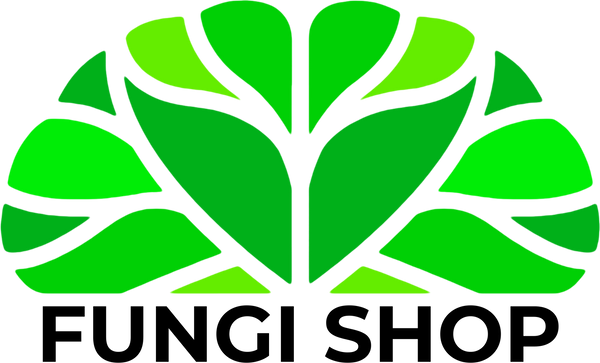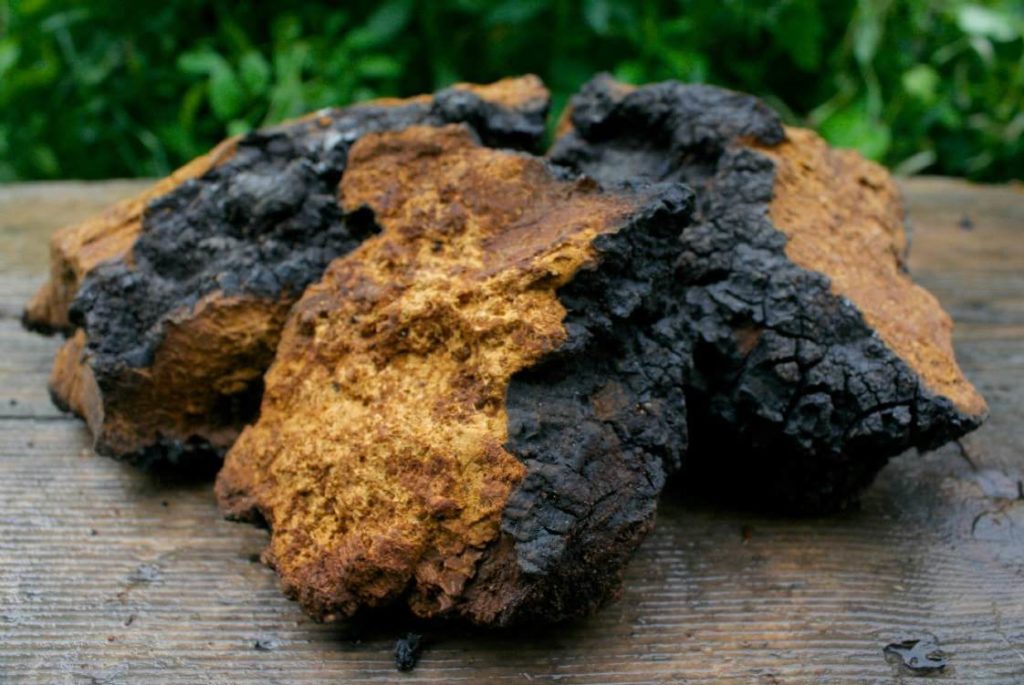Chaga, also known as the "Black Gold of the Forest," has an intriguing history dating back to ancient cultures and civilizations. Indigenous peoples in areas such as Siberia, North America and Scandinavia valued this mushroom for its supposed medicinal properties and often mentioned it with respect and awe.
Its History and Cultural Significance
The history of Chaga is steeped in folklore and traditional custom. Ancient shamans and healers considered Chaga a precious gift from the forest, a powerful source of natural healing energy. It was often used as an ingredient in medicinal concoctions and tonics to treat a variety of health conditions, from digestive problems to fatigue.
What Exactly Is Chaga?
Chaga, scientifically known as Inonotus obliquus (birch fungus), is a fungus that grows on the bark of birch trees. It has a unique appearance, with its dark, hard exterior and a striking orange interior. This fungus has adapted to survive in harsh conditions and has developed into a powerful reservoir of bioactive compounds. Because Chaga lives parasitically on living trees, it is considered a natural survival strategy of the fungus.
Chaga's distinctive appearance and potential as a natural health remedy have captured the attention of scientists, health experts and wellness enthusiasts around the world. Its profound effect on the human body and potential health benefits make it a fascinating topic of research and exploration.
Nutrient Density and Composition of Chaga
Chaga, also called the "Black Gold of the Forest", is a true treasure of nutrients and bioactive compounds. Its impressive nutritional profile has led to widespread recognition and research into its potential health benefits.
Vitamins, Minerals and Antioxidants
Chaga harbors a range of essential nutrients that contribute to its potential as a valuable health support. Vitamins such as vitamin D, B complex vitamins and antioxidant-rich vitamin C may be present in varying amounts in Chaga. Minerals such as potassium, calcium, iron and zinc can also contribute to its nutritional value.
Antioxidants, which help neutralize harmful free radicals in our bodies, are a standout property of Chaga. Phenolic compounds such as flavonoids and melanin are present in Chaga and are associated with its antioxidant capabilities. These can help protect cells from oxidative stress and damage.
Polysaccharides and Beta-Glucans
Chaga is best known for its content of polysaccharides and beta-glucans. These complex carbohydrates play a crucial role in modulating our immune system. Beta-glucans can boost the immune response, help regulate inflammation and support healthy immune function. This makes Chaga an interesting option for those who want to strengthen their immune system.
Chaga's unique composition and abundance of valuable nutrients have led to growing interest in its potential to support our overall health and well-being. Research continues to provide new insights into the powerful interaction between the bioactive compounds in Chaga and our bodies.
The Purported Benefits of Chaga
Chaga's rich history and distinctive nutritional profile have led to a wide range of purported health benefits. While more research is needed to confirm some claims, there are promising insights that highlight Chaga's potential as a valuable natural support.
Immune system support
One of the most notable benefits of Chaga is its potential immune system support. The presence of beta-glucans and polysaccharides in Chaga may help stimulate a healthy immune response. These compounds can help activate and regulate immune cells, which is essential for effective defense against pathogens and infections.
Possible Anti-Inflammatory Properties
Chaga has long been praised for its possible anti-inflammatory properties. The phenolic compounds in Chaga, including antioxidant-rich flavonoids, may help reduce inflammation in the body. This can be important for promoting a healthy inflammatory response and reducing excessive inflammation that can contribute to several health problems.
Antioxidant Power and Cell Protection
Another crucial benefit of Chaga is its powerful antioxidant effect. The phenolic compounds in Chaga, such as melanin and flavonoids, can help neutralize harmful free radicals that cause cellular damage. By protecting cells from oxidative stress, Chaga may play a role in maintaining healthy cell structure and function.
Although more research is needed to fully confirm these benefits, both traditional uses and scientific research show that Chaga is an intriguing mushroom with the potential to support our health and well-being in multiple ways. The continued research into Chaga's bioactive compounds opens the door to new insights and possibilities for its uses.
Chaga and Health: Myth or Reality?
The centuries-long fascination with Chaga as a medicinal mushroom has led to a complex and sometimes controversial debate about its actual health benefits.
Scientific Research and Clinical Studies
In recent years, there has been an increasing interest in researching the potential health benefits of Chaga. Scientific studies have identified several bioactive compounds in Chaga, including antioxidants, polysaccharides and phenolic compounds. These compounds have been the subject of laboratory and animal studies indicating possible immune-stimulating, anti-inflammatory and antioxidant properties.
While many of these studies have shown promising results, it is important to note that most of the research to date is in the early stages. More extensive research, including human clinical trials, is needed to definitively determine Chaga's specific benefits and mechanisms of action.
Traditional Use in Public Health
In addition to scientific research, Chaga has a long history of traditional use in public health. Several indigenous communities in cold regions, including Siberia, Russia and parts of North America, have used Chaga as a medicinal remedy for centuries. The traditions and stories surrounding Chaga testify to its status as "black gold" and reflect the belief in its potential to promote health and well-being.
While the traditional use of Chaga is a valuable source of knowledge, it is important to remember that historical use is not necessarily scientific evidence. Nevertheless, the combination of traditional use and ongoing scientific research provides an intriguing basis for further exploration of Chaga's potential benefits for our health.
How to Use Chaga and What to Look For
Proper use of Chaga is essential to take full advantage of its potential health benefits.
Different Forms of Consumption
Chaga is available in different forms that range from tea to powder and supplements . A popular way to consume Chaga is to make tea from it. Dried Chaga chunks can be used to brew a rich and earthy tea, extracting the mushroom's bioactive compounds.
In addition, Chaga is also available in powder form and as supplements, such as capsules or tinctures . These forms provide a convenient way to add Chaga to your daily routine, especially for those who may find the taste of Chaga tea less appealing.
Dosage and Recommendations
Although no standard dosage for Chaga has been established, there are general guidelines you can follow. For example, when making Chaga tea, you can start with about 1 to 2 teaspoons of dried Chaga chunks per cup of boiling water. Let the tea steep for about 15 to 20 minutes to extract the bioactive compounds.
For Chaga powder and supplements, it is important to follow the recommended dosage on the product label. Excessive use can potentially have unwanted effects, so it is wise to stay within the recommended limits.
When using Chaga, it is always a good idea to consult with a health professional, especially if you have pre-existing health conditions or are taking medications. They can advise you on the most appropriate dosage and method of use based on your individual needs.
Possible Side Effects and Precautions
Although Chaga is generally considered safe, there are some precautions you should take when using it. Individuals with allergies to mold or mushrooms may experience an allergic reaction and may need to avoid Chaga.
Interactions with medications may also be possible. If you are taking medications or have health problems, it is advisable to consult a healthcare provider before use.
It is important to realize that Chaga is not a miracle cure and its potential benefits are based on several factors. It can complement a healthy lifestyle, but it does not replace medical treatment or advice.
By being aware of these precautions and choosing wisely where you purchase Chaga, you can enjoy the potential benefits of this special mushroom with confidence.
Chaga in Modern Society: Trends and Popular Use
Chaga has carved out an impressive place in the booming wellness and natural health movement. More and more people are looking for natural ways to support their well-being, and Chaga offers a fascinating option. The mushroom is valued for its potential to strengthen the immune system, reduce inflammation and provide cellular protection.
As a complement to a healthy lifestyle, Chaga has attracted the interest of both health enthusiasts and experts in alternative medicine. It fits seamlessly into the broader movement towards natural remedies and holistic approaches to wellness.
Fame and Rise as a Superfood
Chaga has quickly developed into a superfood distinguished by its impressive nutritional profile and potential health benefits. It is not only a popular choice for people who are conscious about their health, but also for gourmets looking for new taste experiences.
Chaga's fame continues to grow, thanks in part to social media, wellness blogs and health experts. More and more people are discovering the versatile applications of Chaga in various recipes and drinks. From Chaga tea to tonics and smoothies, the possibilities are endless.
Disclaimer: The information contained in this blog post is for educational and general information purposes only. The information provided is not intended as medical advice and should not be considered a substitute for professional medical advice, diagnosis or treatment. Always consult a qualified healthcare provider before making any changes to your diet, lifestyle or health regimen. The statements and claims made about specific products are based on general knowledge and information and have not been evaluated by the European Food Safety Authority (EFSA) or other relevant authorities. Fungi Shop accepts no liability for any damage or injury caused by following the information in this blog post.

